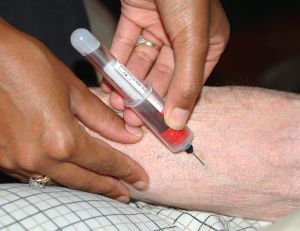 Federal law, especially 18 U.S.C. section 922, provides additional limitations on where you can carry. First, it outlaws a person “knowingly to possess a firearm that has moved in or that otherwise affects interstate or foreign commerce at a place that the individual knows, or has reasonable cause to believe, is a school zone.” The term “school zone” means A) in, or on the grounds of, a parochial or private school; or B) within a distance of 1,000 feet from the grounds of a public, parochial, or private school. “School” means a school which provides elementary or secondary eduaction, as determined under State Law. This Federal section does not apply to possession of a firearm 1) on private property not part of school grounds; 2) to a person properly licensed to carry in a school zone; 3) a firearm that is unloaded and locked in a container or on a rack; 4) for use in a program approved by a school in the school zone; 5) or that is unloaded and possessed by an individual while traversing school premises for the purpose of gaining access to public or private lands open to hunting. 18 U.S.C. section 930 additioanlly prohibits carrying weapons on the actual premises (buildings and parts thereof) of property owned or leased by the Federal government or by the Federal Courts.
Federal law, especially 18 U.S.C. section 922, provides additional limitations on where you can carry. First, it outlaws a person “knowingly to possess a firearm that has moved in or that otherwise affects interstate or foreign commerce at a place that the individual knows, or has reasonable cause to believe, is a school zone.” The term “school zone” means A) in, or on the grounds of, a parochial or private school; or B) within a distance of 1,000 feet from the grounds of a public, parochial, or private school. “School” means a school which provides elementary or secondary eduaction, as determined under State Law. This Federal section does not apply to possession of a firearm 1) on private property not part of school grounds; 2) to a person properly licensed to carry in a school zone; 3) a firearm that is unloaded and locked in a container or on a rack; 4) for use in a program approved by a school in the school zone; 5) or that is unloaded and possessed by an individual while traversing school premises for the purpose of gaining access to public or private lands open to hunting. 18 U.S.C. section 930 additioanlly prohibits carrying weapons on the actual premises (buildings and parts thereof) of property owned or leased by the Federal government or by the Federal Courts.
The prohibitions mentioned here are not exhaustive, and you should read Chapter 46 of the Texas Penal Code at www.state.tx.us and the Federal laws online, or contact an attorney or the ATF if you have questions about your right to carry in Texas. You should also decide whether you personally should choose to carry a weapon, and whether you are ready for its responsibilities (including the laws and consequences of using deadly force on another human being). Also, making a loaded firearm accessible to a child (under 17 years old) is a Class A misdemeanor in Texas. Talk to people who know about firearms at Red River Firearms 903-893-8449, Shooters Supply 903-868-8543 or your firearms dealer to decide what is right for you. Read the statutes and become familiar with both the law and the safety issues concerning your particular weapon if you plan to carry regularly.
 Sherman & Plano, TX Criminal Defense Lawyer Blog
Sherman & Plano, TX Criminal Defense Lawyer Blog



 If you are convicted at trial, but the court in which your case is heard is not a “court of record,” i.e. there is not a court reporter present and dictating the record for review on appeal, you have the right to force a new trial in its entirety in a higher court. This is done by filing an appellate bond in the lower court within 10 days after the date the judgment was entered. This should be done in accordance with articles 45.0425 and 45.0426 of the Code of Criminal Procedure.
If you are convicted at trial, but the court in which your case is heard is not a “court of record,” i.e. there is not a court reporter present and dictating the record for review on appeal, you have the right to force a new trial in its entirety in a higher court. This is done by filing an appellate bond in the lower court within 10 days after the date the judgment was entered. This should be done in accordance with articles 45.0425 and 45.0426 of the Code of Criminal Procedure. It is in the news daily that guns and ammunition are selling at record rates. This article is to help you understand some of the current law regarding your right to bear arms, primarily the places you are not allowed to carry in Texas. Concealed license holders have a more extensive set of rules that are not focused on here.
It is in the news daily that guns and ammunition are selling at record rates. This article is to help you understand some of the current law regarding your right to bear arms, primarily the places you are not allowed to carry in Texas. Concealed license holders have a more extensive set of rules that are not focused on here. A million words have been written about Andre Thomas, the Sherman, Texas death row inmate whose brutal act of capital murder I will not describe here. Needless to say, infant children and their mother were killed by knife in about as grotesque of a manner possible.
A million words have been written about Andre Thomas, the Sherman, Texas death row inmate whose brutal act of capital murder I will not describe here. Needless to say, infant children and their mother were killed by knife in about as grotesque of a manner possible. My day is ruint when I receive a traffic ticket, and I bet yours is as well. However, there are legal advantages to fighting back in traffic court when you are in the right. I am often called about representation on traffic tickets, but few people hire lawyers in traffic court except for commercial drivers. The “point system” which we all accumulate on traffic tickets, which can result in a surcharge or a suspension of certain drivers licenses, is even more pressing when you drive for a living.
My day is ruint when I receive a traffic ticket, and I bet yours is as well. However, there are legal advantages to fighting back in traffic court when you are in the right. I am often called about representation on traffic tickets, but few people hire lawyers in traffic court except for commercial drivers. The “point system” which we all accumulate on traffic tickets, which can result in a surcharge or a suspension of certain drivers licenses, is even more pressing when you drive for a living. Assault is broadly defined under Texas law. Under Section 22.01 of the Penal Code, one commits an assault if he (1) intentionally, knowingly or recklessly causing bodily injury to another, including the person’s spouse; or (2) intentionally or knowingly threatens another with imminent bodily injury, including the person’s spouse, or (3) intentionally or knowingly causes physical contact with another when the person knows or should reasonably believe that the other will regard the contact as offensive or provocative. Non-bodily injury assault (by threat or contact under (2) or (3) are normally Class C misdemeanors). You must be very careful with these two charges as well, for even Class C misdemeanor assaults appear to allow family violence findings that result in an enhancement to a third degree family if a later family violence assault is charged.
Assault is broadly defined under Texas law. Under Section 22.01 of the Penal Code, one commits an assault if he (1) intentionally, knowingly or recklessly causing bodily injury to another, including the person’s spouse; or (2) intentionally or knowingly threatens another with imminent bodily injury, including the person’s spouse, or (3) intentionally or knowingly causes physical contact with another when the person knows or should reasonably believe that the other will regard the contact as offensive or provocative. Non-bodily injury assault (by threat or contact under (2) or (3) are normally Class C misdemeanors). You must be very careful with these two charges as well, for even Class C misdemeanor assaults appear to allow family violence findings that result in an enhancement to a third degree family if a later family violence assault is charged. In Texas, should you refuse any breath or blood test requested by an officer if investigated for DWI? Yes. Of course. Every time. They are not asking for your breath or blood so they can “see if you are innocent.” They believe you are guilty and want more evidence to show to a judge or jury to prove you are guilty. The screwups in the machine and the blood draw work in their favor, not yours. Plus, if they take your blood, they will not even have the results for three, four, maybe more months down the road. You aren’t going home, and they will almost certainly not let you go home no matter the result of the test.
In Texas, should you refuse any breath or blood test requested by an officer if investigated for DWI? Yes. Of course. Every time. They are not asking for your breath or blood so they can “see if you are innocent.” They believe you are guilty and want more evidence to show to a judge or jury to prove you are guilty. The screwups in the machine and the blood draw work in their favor, not yours. Plus, if they take your blood, they will not even have the results for three, four, maybe more months down the road. You aren’t going home, and they will almost certainly not let you go home no matter the result of the test. Over the years, I have tried many jury trials and achieved real results for real people. I only represent human beings faced with loss of freedom and property, and I play to win. I am not a “settlement” lawyer who gets the best deal possible and talks the client into it. I get the best deal possible and give people the reasons in favor of taking it and the reasons to reject it and go to trial. It is 100% the accused’s decision, which I can help them make correctly.
Over the years, I have tried many jury trials and achieved real results for real people. I only represent human beings faced with loss of freedom and property, and I play to win. I am not a “settlement” lawyer who gets the best deal possible and talks the client into it. I get the best deal possible and give people the reasons in favor of taking it and the reasons to reject it and go to trial. It is 100% the accused’s decision, which I can help them make correctly.  Family violence has evolved dramatically through time, most of it in the last few decades. At common law, a wife and children were property that the husband/father could deal with as he pleased for the most part. The world has grown up, and we now have very strict family violence statutes. Many men (and some women) are often falsely accused of family violence resulting lifelong disabilities and loss of civil rights. Domestic violence is a serious issue, but many uncscrupulous people take advantage of our lack of tolerance for domestic abuse.
Family violence has evolved dramatically through time, most of it in the last few decades. At common law, a wife and children were property that the husband/father could deal with as he pleased for the most part. The world has grown up, and we now have very strict family violence statutes. Many men (and some women) are often falsely accused of family violence resulting lifelong disabilities and loss of civil rights. Domestic violence is a serious issue, but many uncscrupulous people take advantage of our lack of tolerance for domestic abuse. My name is Micah Belden and I am a criminal defense lawyer in Sherman, Texas -the city in which I was born and will be buried. I was raised and currently live in Howe, Texas. My father was a farmer and my mom a housewife. We were forced to sell the farm early in life, and I watched my dad labor hard to feed our family. I try to bring his backbreaking work ethic to the practice of criminal law.
My name is Micah Belden and I am a criminal defense lawyer in Sherman, Texas -the city in which I was born and will be buried. I was raised and currently live in Howe, Texas. My father was a farmer and my mom a housewife. We were forced to sell the farm early in life, and I watched my dad labor hard to feed our family. I try to bring his backbreaking work ethic to the practice of criminal law.